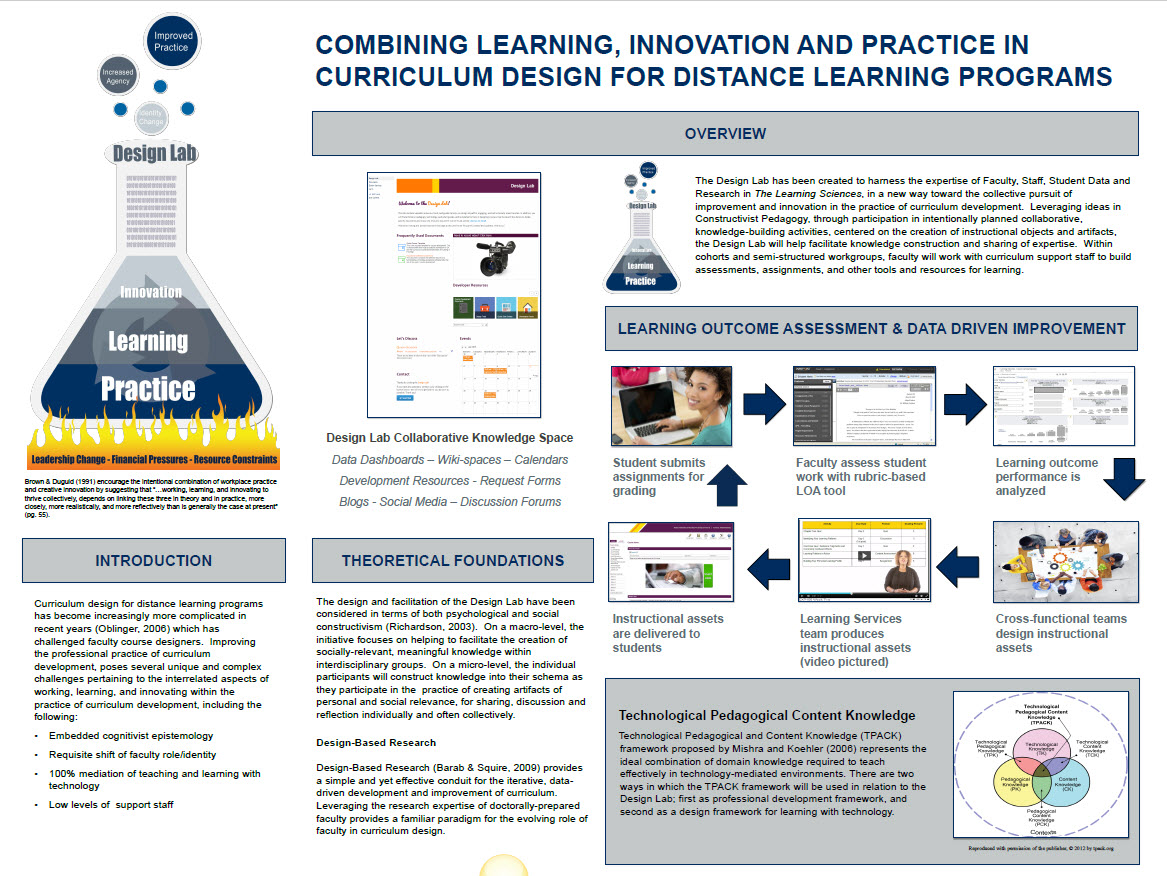Design Lab: Combining Learning, Innovation and Practice in Curriculum Design for Distance Learning Programs
One significant affordance of the tool is the ability of the faculty to collect and analyze data in ways that illuminate phenomenon not otherwise detectable by human sensory perception alone. Information about student performance can be visualized within a single section of class, or at the programmatic level, and aggregated measure of all assessments captured, or any combination therein determined appropriate. Figure 3.2 shows an example of how learning outcome assessment data can be visualized to help determine the effect of instructional interventions, in EDU120 Principles of Instructional Design, in relation to LO1, with related metrics.
Figure 3.2 Learning Outcomes Dashboard Interface
Participant Feedback
The project will in part be assessed by a qualitative analysis of anonymous feedback for the participants. The beginning of the project a qualitative: open-ended survey was designed and administered to determine the lived experiences of the faculty and staff involved in curriculum development. Data were analyzed through thematic analysis and used to inform the vision creation by the guiding coalition, focusing on information transparency and availability, increase desire for faculty agency, and less administrative impact on curriculum.
Thought the initial survey was informative in helping to gauge the perceptions of participants in curriculum development, if would be a foolish to stop at a single measure. The Design Lab will regularly offer channels for open and anonymous feedback on processes, resources on an ongoing basis. Having honest, dialogue in the community while simultaneously providing alternate channels to raise issues in nonthreatening ways is a key component of the measurement of the effectiveness of the Design Lab in serving the broad range of stakeholders.
Ongoing Phenomenological Assessment
Due to the ongoing nature of the Design Lab and the expectation of future improvement and iteration, a summative assessment for the initiative is challenging to create. The guiding coalition meets twice monthly to discuss progress, resolve issues and determine future directions. One of the benefits of having a strong guiding coalition representing leadership of all of the stakeholder participants is the ability to communicate with other leaders both spontaneously and at planned intervals.
Members of the guiding coalition comprise a large part of the Provost’s Cabinet, a group of Senior Academic Leaders consisting of Department Directors, VPs and AVPs, Deans, and the Provost. and topics are discussed regarding a number of different projects and initiatives, etc. The Curriculum/Design Lab team will provide regular updates on the progress of the design lab, and cabinet members will have time to ask questions and work through issues of significance on a bimonthly basis. Additionally, regular monthly meetings have been scheduled with the Academic Deans to discuss issues of prioritization of course developments or other emergent issues of concern.
References
Ahearn, L. M. (2001). Language and agency. Annual review of anthropology, 109-137.
Allen, E., & Jeff, S. (2013). Changing Course: Ten Years of Tracking Online Education in the United States. 1-47. Retrieved June 1, 2015, from http://www.onlinelearningsurvey.com/reports/changingcourse.pdf
Benkler, Y. (2006). The wealth of networks: How social production transforms markets and
freedom. New Haven, CT: Yale University Press.
Brown, J. S., Denning, S., Groh, K., & Prusak, L. (2005). Storytelling in organizations: Why
storytelling is transforming 21st century organizations and management. Burlington, MA:
Elsevier Butterworth-Heinemann.
Brown, J. S., & Duguid, P. (1991). Organizational learning and communities-of-practice: Toward a unified view of working, learning, and innovation. Organization science, 2(1), 40-57.
Brown, Tim. “Design thinking.” Harvard business review 86.6 (2008): 84.
Dewey, J. (1938). Experience and education. New York: Kappa Delta Pi.
Horn, L. J., & Carroll, C. D. (1996). Nontraditional undergraduates: Trends in enrollment from 1986 to 1992 and persistence and attainment among 1989-90 beginning postsecondary students. Postsecondary education descriptive analysis reports. Statistical analysis report. (No. NCES-97-578) Washington, DC: Government Printing Office.
Jenkins, H. (2006). Convergence culture: Where old and new media collide. NYU press.
Kafai, Yasmin B. Constructionism. na, 2006.
Kanselaar, G. (2002). Constructivism and socio-constructivism. Retrieved November, 20, 2010.
Kirschner, P. A., Sweller, J., & Clark, R. E. (2006). Why minimal guidance during instruction does not work: An analysis of the failure of constructivist, discovery, problem-based, experiential, and inquiry-based teaching.Educational psychologist, 41(2), 75-86.
Koehler, M. J., Mishra, P., Kereluik, K., Shin, T. S., & Graham, C. R. (2014). The technological pedagogical content knowledge framework. In Handbook of research on educational communications and technology (pp. 101-111). Springer New York.
Kotter, J. P. (1995). Leading change: Why transformation efforts fail. Harvard business review, 73(2), 59-67.
Kuh, G. D., & Ewell, P. T. (2010). The state of learning outcomes assessment in the United States. Higher Education Management and Policy, 22(1), 1-20.
Kyun, S., Kalyuga, S., & Sweller, J. (2013). The effect of worked examples when learning to write essays in English literature. The Journal of Experimental Education, 81(3), 385-408.
Lave, J., & Wenger, E. (1991). Situated learning: Legitimate peripheral participation. New
York: Cambridge University Press.
Mishra, P., & Koehler, M. J. (2003). Not “what” but “how”: Becoming design-wise about educational technology. What teachers should know about technology: Perspectives and practices, 122.
Mishra, P., & Koehler, M. (2006). Technological pedagogical content knowledge: A framework for teacher knowledge. The Teachers College Record,108(6), 1017-1054.
Oblinger, D. (2006, January 1). The Myth about Online Course Development. Retrieved April 1, 2015, from http://www.educause.edu/ero/article/myth-about-online-course-development
Paas, F., van Gog, T., & Sweller, J. (2010). Cognitive load theory: New conceptualizations, specifications, and integrated research perspectives. Educational Psychology Review, 22(2), 115-121.
Paas, F., Renkl, A., & Sweller, J. (2003). Cognitive load theory and instructional design: Recent developments. Educational psychologist, 38(1), 1-4.
Pellegrino, J. W., & Altman, J. E. (1997). Information technology and teacher preparation: some critical issues and illustrative solutions. Peabody Journal Of Education (0161956X), 72(1), 89-121.
Portes, A. (2000). Social capital: Its origins and applications in modern sociology. LESSER, Eric L. Knowledge and Social Capital. Boston: Butterworth-Heinemann, 43-67.
Shulman, L. S. (1987). Knowledge and teaching: Foundations of the new reform. Harvard educational review, 57(1), 1-23.
Sweller, J. (1994). Cognitive load theory, learning difficulty, and instructional design. Learning and Instruction, 4, 295-312. doi: 0959-4752(84)00010-7
Vygotsky, L. S. (1978). Mind in society: The development of higher psychological processes. Cambridge, MA: The Harvard University Press.
Wenger, E. (2009). A social theory of learning. Contemporary theories of learning: learning theorists–in their own words. Routledge, New York, NY, 209-218.
Wiggins, G., & McTighe, J. (2005). Understanding by design. (2nd ed.). Alexandria, VA: Association for Supervision and Curriculum Development.





